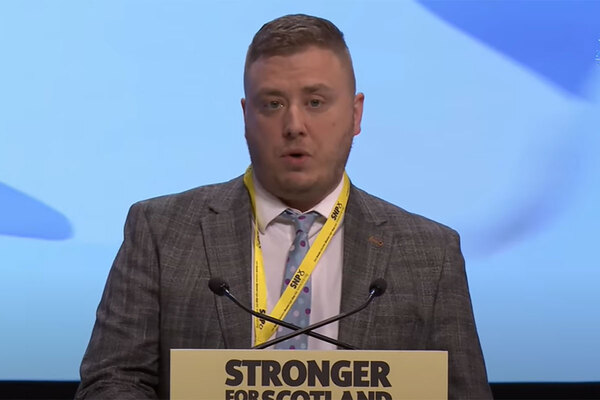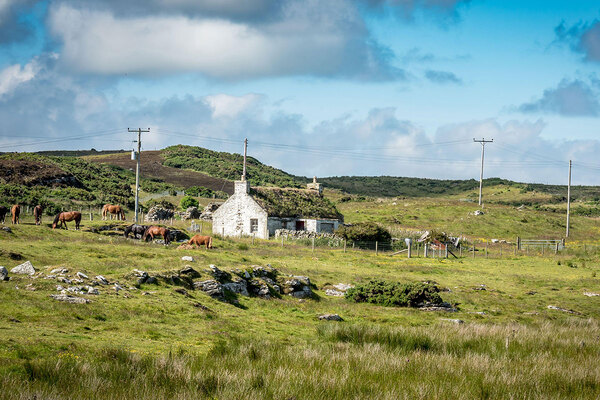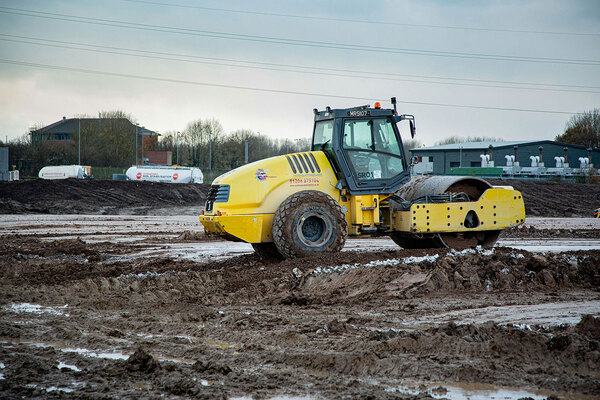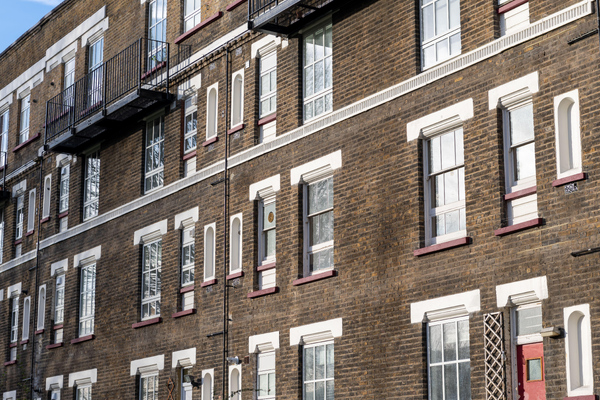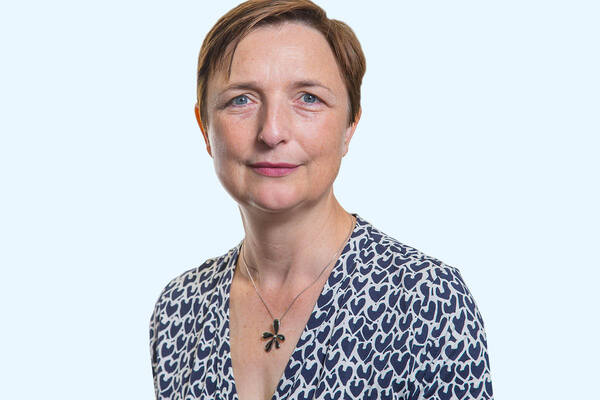You are viewing 1 of your 1 free articles
Dispatches from the SNP conference 2023
The Scottish National Party descended on Aberdeen to host its annual conference this week. James Riding reports on all the housing action
Perhaps Scotland’s first minister, Humza Yousaf, will be happy that his first conference as party leader was a subdued one.
The atmosphere in Aberdeen’s vast, modern TECA conference centre was distinctly muted. Even a lonely demonstrator dressed as a T-rex outside had very little roar inside him.
Yet anything would be preferable to the chaos of a police investigation, defection and byelection loss that characterised Mr Yousaf’s first seven months in office.
Ahead of the event, housing minister Paul McLennan had taken a holiday after finishing the Scottish government’s Rural and Islands Housing Action Plan, so there was no expectation of any new announcements for the sector in Scotland.
However, the first minister had one interesting housing announcement up his sleeve.
Mr Yousaf told delegates he would issue Scotland’s first ever bond by 2026 to raise money for affordable housing and other infrastructure projects (and, he hopes, help to establish Scotland’s financial independence from the UK).
Other than that, there was little mention of housing on the main stage – a striking omission since the Scottish government is progressing a raft of critical housing legislation.
Scottish National Party (SNP) ministers, in coalition with the Green Party, are working on everything from homelessness prevention duties for social landlords to permanent rent controls for the private sector.
In addition to minimum energy standards for homes and a Passivhaus-style standard for new builds.
But on top of all of that, fears are mounting that the government’s target of 110,000 new social homes by 2032 is slipping out of reach.
Inside Housing scoured the fringe events and grilled ministers to find out the latest.
Warm hubs and land reform
Sunday in Aberdeen was dominated by debates on the SNP’s independence strategy and how the next Westminster election should be fought. The tedious nature of the conversation was memorably summarised by an SNP member as “flatulence in a trance”.
At a fringe event on the cost of living and energy crises, Gillian Martin, minister for energy and the environment, reflected on the challenges of helping residents living in fuel poverty.
“One thing that I did only do once, that I won’t do again, is a cost of living surgery, because nobody came to it,” she said.
She also expressed scepticism about “warm hubs”, where people have to go outside their own homes to receive help and advice. “I don’t think that they work, I don’t think they’re particularly dignified,” she said. “What we want to do is make sure that people can actually afford to be in their own homes.”
The minister refused to confirm to Inside Housing if the Scottish government would extend the social housing fuel support fund until the end of the parliamentary term, saying it was a matter for deputy first minister Shona Robison. However, she added pointedly: “This is a crisis that’s not going away.”
Another fringe event discussed the government’s forthcoming Land Reform Bill, which could transform both rural and urban development.
Iain Black, professor of practice at the University of Strathclyde, told the story of a housing association in Edinburgh that tried to build an affordable development with generous room sizes and triple glazing on land owned by the Duke of Buccleuch.
However, they couldn’t do it “because the cost of land was so great down there”.
Every day “kids are living in bedrooms that are cramped,” he said, “because we haven’t acted on this in the decade we’ve been in power. We should be ashamed of that.”
Yet John Mason, MSP for Glasgow Shettleston, pointed out that tricky brownfield sites are not so valuable and have previously been shunned by developers. “Some of the land in Glasgow is worth less than nothing,” he said. “It’s not just as simple as if you gave the land to people, they would all take it.”
Rural housing and the ageing population
On Monday, delegates debated the idea of paying young people to move to the Highlands, where the working age population has declined and key workers struggle to access accommodation.
Maree Todd, MSP for Caithness, Sutherland and Ross, suggested that the government could set up a fund to help young people access affordable finance to buy land or homes in rural areas.
However, she told delegates that a permanent restriction on use would have to apply to stop the houses quickly being turned into second homes.
“We need government support to restore our population in the Highlands,” she said. “If depopulation is not addressed, the cost of supporting rural communities will continue to rise.”
While the Scottish government has not gone this far yet with official policy, it is supporting the Communities Housing Trust and has also allocated £25m from the existing affordable housing programme to help councils buy homes for key workers.
At a panel hosted by the Joseph Rowntree Foundation, Chris Birt, associate director for Scotland at the JRF, said he was concerned about housing costs driving older people into poverty.
“People could, in the past, have approached retirement knowing [that] if they had access to state pension they’d probably be alright,” he said.
“If you add housing costs into the mix, people now in their late 50s, early 60s thought they’d be able to pay off their mortgage but their mortgage payments have just gone up by 40%. That is creating a real risk for older people in Scotland.”
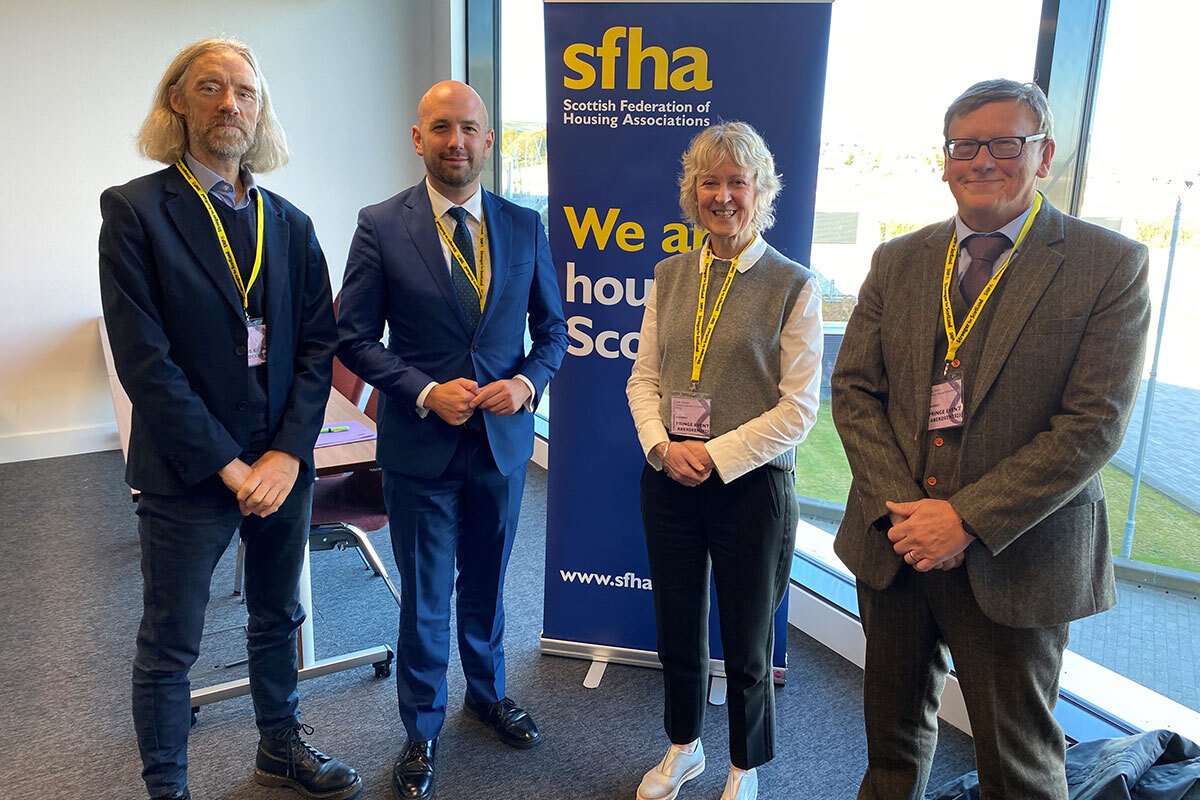
Moving on, innovative housing solutions for older people were discussed at a panel discussion hosted by Marie Curie. Jenni Minto, minister for public health and women’s health, said that on the island of Mull in her constituency a new housing project was integrating different types of occupancy, inspired by Denmark.
Collette Stevenson, MSP for East Kilbride, said local authorities in her constituency had started purchasing private housing “especially for bigger families and [people with] disabilities”. “That’s actually a good news story for a change,” she added.
Back on the main stage, Glasgow councillors warned that the city would soon have to find permanent accommodation for more than 1,000 refugees after the Home Office vowed to resolve asylum claims en masse.
“This had a real potential to be a humanitarian catastrophe,” said councillor Allan Casey. “We’re in real danger of having to commandeer sports and leisure centres to set up emergency-type accommodation, something you only really see during a natural disaster.”
Passivhaus now?
Emma Roddick, minister for equalities, migration and refugees, is uniquely qualified to address housing issues.
“I have been homeless, and I know that feeling of insecurity,” she told a panel on refugees hosted by the Red Cross on Wednesday. She said she had been “so gutted with Keir Starmer and Labour” for adhering to current asylum practices, adding that many Home Office policies “are going to continue” under a Labour government.
Rob Murray, director for Scotland at the British Red Cross, said that because of a lack of housing across Scotland, more than 200 Ukrainians have declared homelessness in the country. “That’s heartbreaking,” he said. “We need to make sure that the housing stock is being built.”
The Scottish Federation of Housing Associations (SFHA) also held a panel on tackling poverty and ending homelessness.
John Dickie, director of the Child Poverty Action Group, praised the Scottish government’s relatively higher investment in social rented housing compared to other parts of the UK but warned that the Scottish government should not be complacent.
“We need to see the Budget invest in affordable and social housing” in December, he said, particularly homes for larger families with low incomes.
Sally Thomas, chief executive of the SFHA, pointed out that Scotland’s lack of housing means people cannot move to access employment. “There are major economic opportunities, but there aren’t the homes to provide for the workers who need to come in to fulfil those economic opportunities.”
To address the shortage, the government must intervene, she said, “not just leave it to the market”.
Craig Stirrat, chief executive of Grampian Housing Association, explained why housing associations “have to increase rents every year”. Standards of compliance are “going up all the time,” he said, “and there’s new challenges all the time that have to be paid for”.
He highlighted the work Grampian is doing with tenants who might have difficulty sustaining their tenancy and said the landlord is spending £300,000 a year on retrofit improvements.
Mr Stirrat said he is working with developers to build more bungalows as opposed to flats to meet the challenge of the ageing population. “We would like to see the uncertainty about whether we’re going to get sufficient grant to build affordable homes,” he added.
“At the moment, what we have to do is submit a tender and hope that we see sufficient grant to enable us to make a development viable.”
Inside Housing asked if the Scottish government’s plan for a Passivhaus-style standard for new build homes should be paused given rising construction costs. Midlothian Council has already shelved its own plans to build houses to the exacting energy efficiency standard as they were set to cost over £150,000 more per unit than regular homes.
Former social security minister Ben Macpherson said the real issue with new build standards is with private, not social housing: “At the moment social housing is already built to a higher standard, and most of the issues that I have with quality of the build in my constituency are private [housing].”
However, he said he is reluctant to call on government to halt the plans. “We should always be pushing our standards higher,” he said.
Mr Stirrat took a more cautious tone. He said that he agrees with the Passivhaus Standard in principle, and that costs would reduce with volume, but “we’re not there yet, unfortunately”. He added that Grampian recently put a tender for a specialist housing with care development that was “twice the price that we expected”.
Sign up for our Scotland newsletter
Already have an account? Click here to manage your newsletters

